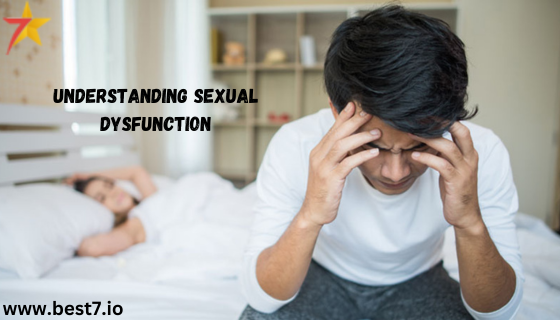
Sexual dysfunction is a concern in itself that has been identified as one of the problems affecting people regardless of which demographic they are. The more inclusive awareness of sexual health is spreading, the stronger will be the focus on knowledge about sexual dysfunction, its causes, symptoms, and how to treat it. The aim of this exhaustive guide is to offer unique knowledge about sexual disorders and how it impacts our holistic health.
Characteristics of Sexual Dysfunction
Sexual dysfunction presents in various forms, and identifying its characteristics is essential for understanding its impacts on individuals and relationships.
Reviewing the Causes of Arousal Problems and Distress
Sexual dysfunction is often a result of several physical and psychological factors. It is, therefore, important to know this information as it is helpful in the treatment and management.
1. Physical Causes of Sexual Dysfunction
Many different diseases may cause or be associated with sexual dysfunction. Nearly half of men and 40% of women have experienced some type of sexual dysfunction during their lifetime, according to the National Institutes of Health (NIH). Physical reasons for ED can include:
- Hormonal Imbalances: Changes in hormones, especially testosterone, estrogen, and progesterone, can interfere with sexual function, leading to issues like erectile dysfunction and decreased libido in men and vaginal dryness or loss of sexual desire in women due to menopause.
- Chronic Illness: Conditions like diabetes, heart disease, and high blood pressure can contribute to sexual dysfunction, affecting circulation, nerve function, and energy levels.
- Medications: Certain medications may cause sexual dysfunction as a side effect, including antidepressants, blood pressure medications, and some cancer treatments.
2. Psychological Causes of Sexual Dysfunction
Psychological stress plays a critical role in sexual dysfunction. Issues like anxiety, depression, and interpersonal conflicts can reduce sexual desire or disrupt performance.
- Anxiety and Stress: Excessive stress and anxiety can lead to performance anxiety, exacerbating sexual dysfunction. Those feeling anxious about sexual performance may avoid intimacy, worsening the issue.
- Depression: Depression is often associated with decreased libido and sexual dysfunction. Depressed individuals may experience significant reductions in libido.
- Relationship Issues: Disagreements and lack of communication between partners can also lead to sexual dysfunction, as research indicates lower sexual satisfaction in couples experiencing relational conflicts.
Identifying Sexual Problems and Symptoms
There are many symptoms of sexual dysfunction, varying widely by individual. Familiarity with these signs may help in early recognition and timely management.
1. Common Symptoms in Men
- ED (Erectile Dysfunction): The inability to get or maintain an erection sufficient for sex, affecting around 52% of men between the ages of 40 and 70.
- Decreased Sexual Desire (Low Libido): This can stem from hormonal imbalances, obesity, or relationship issues.
- Premature Ejaculation: Ejaculation that occurs with minimal stimulation, which can cause dissatisfaction and anxiety.
2. Common Symptoms in Women
- Vaginal Dryness: Often resulting from hormonal changes, particularly post-menopause.
- Reduced Sexual Drive: Typically due to hormonal or psychological factors.
- Pain During Intercourse: Known as dyspareunia, this pain can result from hormonal changes, infections, or psychological issues like anxiety.
Exploring Effective Treatments for Sexual Dysfunction
Medical and lifestyle interventions are available to help manage sexual dysfunction, enabling individuals to work toward a healthier sex life.
1. Medical Treatments
Treatment plans depend on the type of sexual dysfunction an individual experiences.
- Medications: Drugs like sildenafil (Viagra) and tadalafil (Cialis) are commonly prescribed for erectile dysfunction, effective for around 70-80% of men.
- Bioidentical Hormone Replacement: Balancing hormones through therapies like testosterone replacement can help increase libido and sexual function in men.
- Vaginal Estrogen: Localized treatments, such as creams or rings, can restore moisture and elasticity to vaginal tissues.
2. Psychological Counseling
Therapy and counseling can address psychological factors, including performance anxiety and relationship concerns, often using cognitive-behavioral therapy (CBT).
3. Lifestyle Changes
Making lifestyle changes can significantly improve sexual health.
- Good Nutrition and Exercise: A balanced diet and regular exercise enhance blood flow, reduce stress, and support sexual function.
- Stress Management: Practices like mindfulness, meditation, and yoga can help reduce stress, thereby improving sexual performance.
Getting to Grips with Sexual Health Problems
Understanding the role of hormonal changes, psychological factors, and lifestyle choices is essential for managing sexual health issues.
1. Regular Health Check-Ups
Regular check-ups with healthcare providers can catch sexual functioning issues early, allowing for timely treatment.
2. Open Communication
Encouraging open dialogue with partners about sexual health can foster empathy and mutual understanding.
3. Support Groups and Resources
Support groups and educational resources, such as those provided by the Sexual Medicine Society of North America (SMSNA), can offer valuable information and community support for individuals with sexual dysfunction.
Rebuilding Sexual Function and Wellbeing
With medical support, lifestyle changes, and open communication, individuals can work towards enhancing sexual health and achieving a fulfilling, enjoyable sexual experience.












